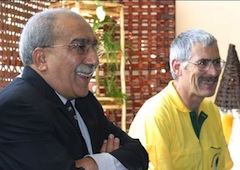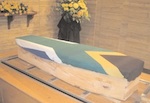| |
|
 |
Prominent South African politician buried in an eco-coffin
July 8, 2011:
 |
 |
 |
Professor Kader Asmal was a friend of the natural world, even in death |
A prominent South African politician who died last month chose to be buried in an eco-coffin, built under the auspices of a project ARC helped start in 2005.
The late Professor Kader Asmal was a professor of human rights, a founder of the British and Irish Anti-apartheid movements and as Minister for Water Affairs and Forestry helped found of the innovative Working for Water programme in South Africa, which employs some 30,000 people a day to clear invasive alien trees which affect the water table levels around the country.
Colleagues hope his decision to choose an eco-coffin will provide an example for others.“Even in death, Professor Kader Asmal promotes sustainable development,” colleagues at the NGO Impumelelo wrote.
The Eco-Coffins programme was started in 2005 by Dr Guy Preston, national leader of the Working for Water programme, who had created a small trust to help families of workers killed or permanently injured while working for the programme – for example, in vehicle accidents.
“Over time we found that many of the families were using this money, which had been intended to help them to cope until Workers’ Compensation could kick in, for fancier coffins and more elaborate funerals,” he told the Cape Argus newspaper last month.
 |
 |
 |
Professor Kader Asmal's simple coffin. Photo: Cape Argus |
“An obvious solution was to use the wood that we were clearing in the programme to make coffins that would help to reduce the burden of bereavement, targeting naturally the poor.”
It was a struggle to get this project off the ground, he recalls. “But the breakthrough came when I was attending a World Bank function where I met Martin Palmer of the international Alliance for Religions and Conservation (ARC), and we talked of using faith-based organisations to market the coffins.”
The project then won a $150,000 grant from the World Bank, which recognised it as one of 31 winners from more than 2,600 entries in its Development Marketplace Awards.
It was a solution to two problems – invasive alien tree species that had to be cut down, and the high cost of funerals, which can cripple poor families.
The World Bank’s funding was used to buy the equipment necessary to set up a factory.
“We’ve been able to manufacture very high-quality coffins and caskets out of the invasive alien pines, and sell them at far lower prices through faith-based organisations than the poor are currently paying, and indeed we’ve been able to reach people who are not even able to afford to bury their loved ones in coffins,” says Preston.
“Equally importantly, we have been able to train and employ over 80 previously unemployed people to work in the various production units for the project at Cedara, near Howick.
“Part of our message is to show people that inexpensive coffins, and simple funerals, can be used in giving people a dignified funeral, so we went to a number of high-profile South Africans to ask if they would commit to being buried in an Eco-coffin. The first person to do so was Professor Kader Asmal.”
Professor Asmal chose a bottom-of-the-range pine coffin with rope handles costing just R300, while a spray-painted, gold-handled coffin is R540. The top-of-the-range casket is R2 400, while special coffins are also available for infants and Jews (metal-free, in keeping with Jewish religious laws).
LinksImpumelelo website
Cape Argus story
Cape Argus story pdf version
WWF Tribute to Professor Asmal
|
 |
 |
|
|
|
|
|
 |
June 27, 2011:
Interview with Sir Miles Hunt-Davis
Sir Miles Hunt-Davis became ARC's international president in 2011. ARC's communications director, Victoria Finlay talked to him about his work as British Commander in Nepal and Prince Philip's private secretary for nearly 20 years, and about the importance of engaging religions in conservation issues. |
 |
Church Times, 22 November 2002:
How to do business for good
Religions have a big stick, says Paul Vallely. It’s the huge funds that they control. |
 |
ARC at a glance
ARC is a secular body that helps the major religions of the world to develop their own environmental programmes, based on their own core teachings, beliefs and practices. |
 |
 |
|
|

